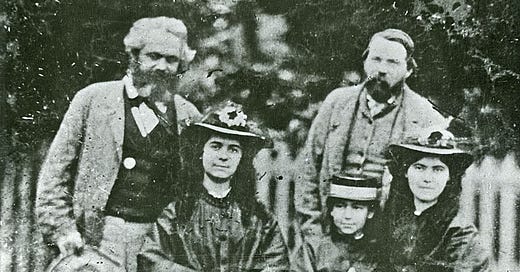I came across this and had to share it — a 1918 Debs article about Marx, penned for The Young Socialists’ Magazine, “the first radical working-class children’s magazine in the United States.”
The day and the year that Karl Marx was born — May 5th, 1818 — appear in red letters in the calendar of the social revolution. For on that day the eyes of the revolution’s prophet and pioneer opened upon the world. In fancy we can see the baby Marx engaged in his first struggle, doing his best and worst in baby fashion to give evidence that he was alive and to have his arrival duly noted. We can next see a little toddler nosing about for a suitable opening for his prying activities, little dreaming of the prodigious task awaiting him on the stage of life.
And now appears the boy, the youth upon the scene, and sober facts begin to jostle rosy dreams in his dawning mentality and imagination. Marx, the boy, was healthy, handsome, and natural, full of the sap and song and sweetness of life.
Like all normal boys he loved play and pranks, and for the same reason he was also serious and studious, and quite early he began to realize that life meant struggle and service and that he must in grave earnest prepare himself to act nobly his part in the great drama that spread out before his awakening vision.
The boy, Marx, in the light of his subsequent phenomenal career, and of the social revolution now thundering at the doors of the capitalist world, presents a vivid theme and a fascinating study for the young people of today who are reaping in knowledge and strength, in inspiration and high resolve, where he sowed in poverty and pain, in suffering and exile, to the very end of his days.
It is peculiarly appropriate that the centenary of the birth of Karl Marx should be celebrated by the Young People’s Socialist League. The program of appreciation would be sadly incomplete without the participation of the young people who have been quickened into new life and have had their eyes opened upon a new world by the magic of his awakening philosophy, and directed toward the shining goal of international freedom and fellowship under his masterly and inspiring leadership.
The heart of every young socialist throbs faster and keener with the zest of life as he contemplates the lofty figure of Karl Marx in perspective and what his coming has meant to the cause of oppressed humanity, especially the enslaved and exploited workers of the world.
Karl Marx, the founder of modern socialism and of the international socialist movement, was indeed an intellectual titan, but he was more than that, he was in the supremest sense a Man! He had the exalted moral character to match his commanding genius. He was firm as an oak, yet tender as a babe. He was absolutely honest. He could not dissimulate. He knew not how to be hypocritical. He was a stranger to the ways of darkness.
What he saw with his keen eye and thought with his clear brain and felt with his warm heart, he also had the courage to utter with his honest tongue and to stand or fall by without equivocation or compromise.
The crowned despots of Europe who hounded Marx and his loved ones into poverty and exile would have vied with each other in opening wide their palace doors to him and showering him with wealth and honors had he but known how to trim and compromise for the sake of harmony and peace.
But Marx did not know how to make traffic of his talents or how to barter away his principles; he scorned to deny the truths he had launched that make thrones tremble, or to betray the trust of the downtrodden who looked to him for counsel and leadership, and this at once sealed his doom and gave his name to glory.
In the harrowing exile and pitiful poverty that followed, the moral heroism of Marx was monumental, and it was during these tragic days and years that his adored wife, the beautiful and charming Jenny of Westphalen, rose to the supreme height of her noble womanhood and sustained the cause for which they were banished with a courage and fortitude that defy fitting characterization.
Jenny Marx, his beloved wife, shared equally with Karl Marx the bitterest poverty and the most relentless persecution for the sake of the cause we love today, and on this centenary anniversary we hail them both with pride and joy as the inspired prophets of internationalism and the thrice-honored leaders of the social revolution.





Am I off here thinking how this seems odd for Debs to portray Marx in this godlike religious sounding way to children?